

Copyright (c) 2025 Punto educativo

This work is licensed under a Creative Commons Attribution-NonCommercial-ShareAlike 4.0 International License.
This article examines the transformation of education in Colombia, focusing on the need to implement a curriculum based on general competencies, especially in the area of mathematics. The main objective is to explore how education in the country has been transformed in recent years, identifying the shortcomings generated by imitating external educational models and the role of teachers in this process. Additionally, the results obtained by Colombia in the PISA tests are analyzed. To work on the topic, various sources were consulted, including authors such as Rico and Lupiáñez, MEN documents and the PISA program. Concepts such as competence and mathematical competence are covered, and problem solving is proposed as a key pedagogical strategy to enhance skills such as reasoning, analysis and communication. Polya's stages of problem solving are presented, applicable to mathematics and other areas, fostering critical thinking and creativity. The main conclusions highlight the damage caused by delimiting competencies by area, generating shortcomings where the teacher ceases to be a guide and becomes an expert in fulfilling administrative requirements. The need to adopt an approach based on general competencies and problem solving to improve teaching, especially in mathematics, is evident.